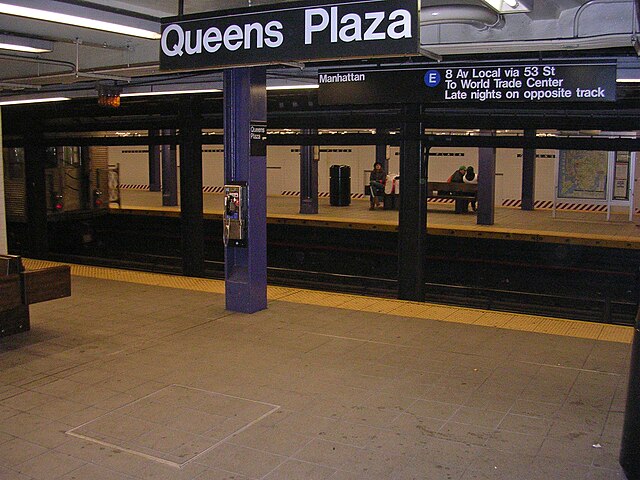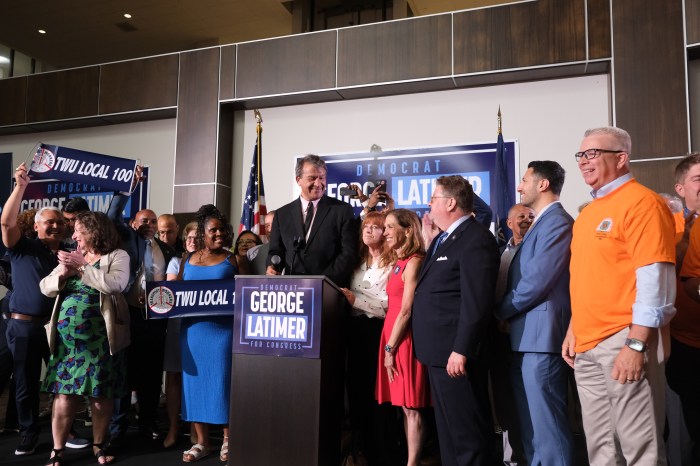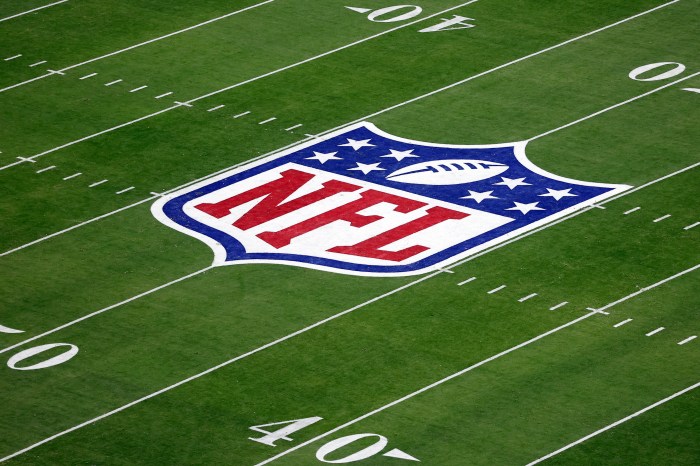With infrastructure talks heating up, lawmakers are urging President Biden and Congress to make a generational, multibillion dollar investment to transform New York’s and the nation’s public transit systems.
On June 6, Congressman Jamaal Bowman joined MTA and NYC officials, public transit riders and the city’s leading accessibility advocates at a rally to shape federal transportation legislation now being negotiated at the White House and on Capitol Hill.
Speakers asked Washington policymakers for $20 billion for urgently needed new elevators, signals, electric buses and transit access in subway deserts and $3 billion annually (out of a $20 billion nationwide program) to maintain and expand frequent and affordable service and avoid devastating fare hikes, service cuts, and job losses when pandemic aid runs out in 2023.
“Congress must transform transit for the Americans who rely on it all across the country, from low-income, rural areas to Black and brown communities like the Bronx,” said Riders Alliance Community Organizer Danna Dennis. “Confronting climate change and racial injustice requires a sustained federal partnership with investment in reliable and accessible infrastructure and in frequent, affordable transit service. Leaders in Washington must deliver for riders, reverse generations of injustice in transportation funding, and secure the future of transit after the pandemic.”
Key #TransformTransit Demands:
-
A debt-free MTA capital program: Congress should provide $20 billion to aid the MTA’s $51 billion 2020-2024 capital program, enabling the agency to perform essential and overdue accessibility and reliability upgrades without borrowing more money after a pandemic year in which debt skyrocketed and revenue plummeted.
-
New support for transit operations: Congress should provide $20 billion in annual federal operating support for frequent and affordable transit service, via a formula that delivers at least $3 billion each year to the MTA to rebuild and expand its services and stop fare hikes as ridership rebounds from the pandemic.
-
Equitable funding for public transit across the nation: Congress must end the Reagan-era 80/20 split between highway and transit funding that drives the decay of urban infrastructure, widens racial divides, and worsens climate change, and instead make a ‘highway-like’ investment in transit.
Now Is The Time To Transform Transit
-
The White House and Congressional leaders are debating President “Amtrak Joe” Biden’s American Jobs Plan for infrastructure
-
The five-year federal surface transportation spending authorization is up for renewal at the end of September
-
The US Senate Majority Leader, Chuck Schumer, a Brooklynite, has been a public transit rider his entire life and recently steered $70 billion to protect the nation’s transit systems from COVID-induced collapse
The MTA Needs More Money for Capital Upgrades and Transit Operations
-
Led by Senator Schumer, New York’s Congressional delegation delivered $15 billion in aid to keep subways and buses running through 2023. But that’s not enough to fix the subway or to stop big job cuts, fare hikes and service cuts in just a few years’ time.
-
The MTA’s capital plan for essential upgrades to signals, accessibility, and more called for $10 billion in new debt, a huge drag on transit finances even before the pandemic.
-
During the pandemic, the MTA borrowed a surprise $3 billion to maintain service last fall, adding to its already crushing debt load.
-
Because of the pandemic, fewer people are riding and MTA revenue has plummeted, making it much harder to pay down existing debt, much less assume new debt.
-
Forecasters predict ridership will approach 80 percent by 2024, leaving the MTA’s annual budget $2 billion in deficit.
New York’s Future is in Grave Jeopardy without More Federal Transit Aid
-
Without new federal aid, the MTA will be unable to make critical improvements and be forced to hike fares and cut service by upwards of 20 percent and slash thousands of jobs.
-
Even the MTA’s ‘doomsday’ bus and train service cuts of 40-50 percent, proposed last August, would only have saved roughly $1 billion annually.
-
If Congress doesn’t stabilize MTA finances, New York’s transit system could enter a death spiral of fare hikes, service cuts, and job losses, halting the city’s recovery and greatly compounding the challenges of climate change and racial inequity.
$20 Billion for Upgrades Would Deliver the Transit System New Yorkers Need and Deserve
-
New station elevators throughout the subway system will delivering access to half a million people previously excluded and welcome New Yorkers of all ages and abilities on board
-
New subway signals to replace New Deal-era technology and restore reliability will save sorely needed time and money for millions of riders who depend on the subway system
-
New routes in areas of the city poorly served by the subway system from East Harlem to the East Bronx will enhance job and educational opportunities for those who need them most
$3 Billion for Service Would Be a Boon for Riders and Transit Workers
-
Fare integration among subways, buses, paratransit, commuter rail and suburban bus systems to make regional transit trips more attractive and affordable
-
More frequent transit service on heavily used lines to reduce crowding and wait times, making transit trips more comfortable and convenient
-
New bus routes and additional service in bus network redesigns to help secure support and deliver faster trips more competitive with other transportation modes
Better Transit Can Address Climate Change and Racial Injustice and Deepen Democracy
-
For many decades, the federal highway program has encouraged fossil fuel-dependency and enabled white flight and urban disinvestment
-
Communities of color were eviscerated by road construction in the 1960s and ‘70s and isolated by inadequate transit from the 1980s to today
-
Leaders who champion public transit hold power in the nation’s highest offices by the slimmest of margins
-
More frequent and affordable public transit service, for more hours of the day, in more communities across the country could be up and running in a matter of months
-
Rarely can a federal initiative improves lives so quickly, redress historical inequities, prove government works, and help restore faith in democratic institutions all at once
-
With so much hinging on 2022 federal election outcomes, Congress and the President now face a unique opportunity to transform transit and, with it, the nation






















